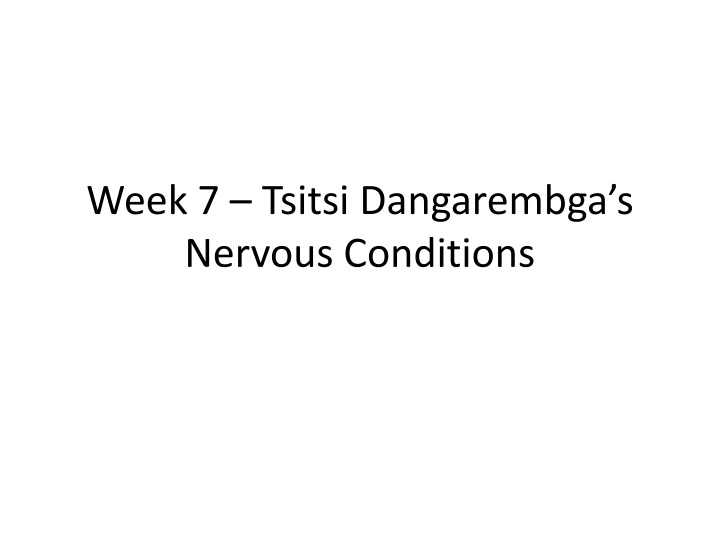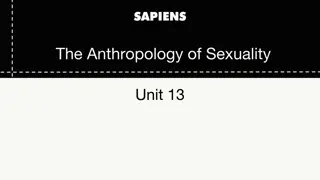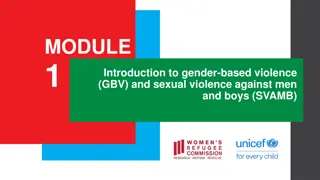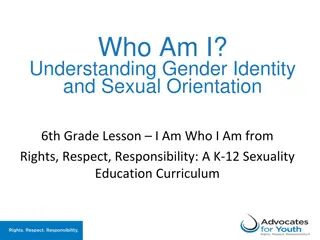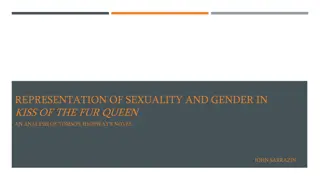Exploration of Gender and Sexuality in Tsitsi Dangarembga's "Nervous Conditions
Tsitsi Dangarembga's novel "Nervous Conditions" introduces a powerful narrative that focuses on the lives of young African girls and women in Zimbabwe during the postcolonial era. The novel challenges traditional gender roles and explores themes of sexuality, identity, and societal expectations. Through characters like Tambudzai and Nyasha, Dangarembga sheds light on the struggles and complexities faced by women in a male-dominated society. The novel has been praised for giving voice to African women and highlighting their significance as subjects of literature, offering a unique perspective on liberation and self-assertion.
Download Presentation

Please find below an Image/Link to download the presentation.
The content on the website is provided AS IS for your information and personal use only. It may not be sold, licensed, or shared on other websites without obtaining consent from the author.If you encounter any issues during the download, it is possible that the publisher has removed the file from their server.
You are allowed to download the files provided on this website for personal or commercial use, subject to the condition that they are used lawfully. All files are the property of their respective owners.
The content on the website is provided AS IS for your information and personal use only. It may not be sold, licensed, or shared on other websites without obtaining consent from the author.
E N D
Presentation Transcript
Week 7 Tsitsi Dangarembgas Nervous Conditions
New Voice Alice Walker has said of the novel that it introduces quite a new voice that in its self- assurance, sounds, at times, very old. As if the African sisters, mothers and cousins of antiquity were, at last beginning to reassert themselves in these perilous times and to speak. It is an expression of liberation not to be missed. What were your thoughts on the novel?
Tambudzai and Nyasha Nervous Conditions highlights what is often effaced from postcolonial African literature in English the representation of young African girls and women as worthy subjects of literature. The novel describes two Zimbabwean girls, Tambudzai and Nyasha and the lives of their mothers and aunts from the mid-1960s to the mid-1970s.
Dangarembga explains: In the 1980 s when she was writing the writers in Zimbabwe were also [like the characters in the literature they produced] basically men at the time. And so I really didn t see that the situation would be remedied unless some women sat down and wrote something .
Her Life Born in 1959 in Zimbabwe. Her parents travelled to England for their education, they returned in 1965. Tsitsi finished school and then went to England in 1977 to study medicine in Cambridge. However, she returned unable to cope with the racism and isolation of England. She returned in 1980 and began studying psychology at the University of Zimbabwe. In 1988 Nervous Conditions was accepted for publication by the Women s Press in London and it went on to win the Commonwealth Writers Prize in 1989.
Critical Responses Elleke Boehmer explored the sexual yearnings and desire in the space of Nyasha s quest for alternatives and possibilities , she also probes the representation of same-sex desire. Brendon Nichols contends that one consequence of anorexia/bulimia is to arrest her development into an adult woman and to remove her from the marriage market. Her nervous condition significantly concludes that Nyasha s destruction of her own body is a breakdown of the economy of reproduction in which a daughter is an object of exchange in exogamy. Derek Wright explores the connection between food and playing with boys . Why is a connection drawn between food and sexuality? How do you perceive Nyasha s father s active surveillance and discipline of his daughter s sexuality?
Nyashas Sexuality Her father s, Babamukuru s surveillance of Nyasha s sexuality is motivated by his need to protect and promote his position within the colonial system. Explore Babamukuru s role in Nyasha s breakdown and his obsession with her sexuality. It has been suggested that it is a result of prurient sexual jealousy . How do you respond to this? It has been contended that Dangaremnga s attitude towards sexuality is ambivalent sex promises freedom and delivers punishment. Discuss
Audre Lorde Audre Lorde The Transformation of Silence into Language and Action famously wrote Your silence will not protect you . Poet, black, mother, lesbian, feminist, warrior, activist whose writing helped to shape black feminism in the late 1970s and 1980s. Lorde s brand of feminism emphasised the need to speak up and avoid the master s tools. Tambu discovers that it is femaleness and not poverty, education, or tradition that is responsible for women s position in society. As she states [female victimisation] did not depend on any things I thought it depended on. Men took it everywhere with them . The revelation is hinted at in the opening line of the novel I was not sorry when my brother died . This unapologetic statement stands out against traditions of male preference and family loyalty because Dangarembga weighs the lives of women and girls against the death of one boy.
Gender Inequality Gender inequality is not a result of class. Both the poor girl striving for achievement and liberation through education, and the privileged girl who wants to acknowledge her sexuality in the face of patriarchal control are oppressed. Dangarembga builds a feminist consciousness through the narrator s growing self-awareness of hypocrisy and sexism. How do the characters resist?
Discussion Questions Is Tambudzai the most tragic figure of the novel because of how she conforms to the role of the grateful, poor female relative, or is there a sense that she is storing up her rebellion in an act of self- destruction that is also a means of self-preservation? Compare Nyasha with Tambudzai and what happens to them. Explore Nyasha s alienation, and whether other women characters in the novel are strangers in their own country . For example, Maiguru, (Nyasha s mother), does she ever seem at home ? What is home for the characters in the novel? Explore women s sexuality within the novel. What are the nervous conditions that women suffer from in the novel? What is the role of language in the novel? What is the significance of Tambu s refusal to go to the wedding?
Reading Mentioned Elleke Boehmer Tropes of Yearning and Dissent: The Troping of Desire in Yvonne Vera and Tsitsi Dangarembga Audre Lorde Sister Outsider: Essays and Speeches by Audre Lorde Brendon Nichols Indexing her Digests: Working through Nervous Conditions Derek Wright Regurgitating Colonialism: The Feminist Voice in Tsitsi Dangarembga s Nervous Conditions
